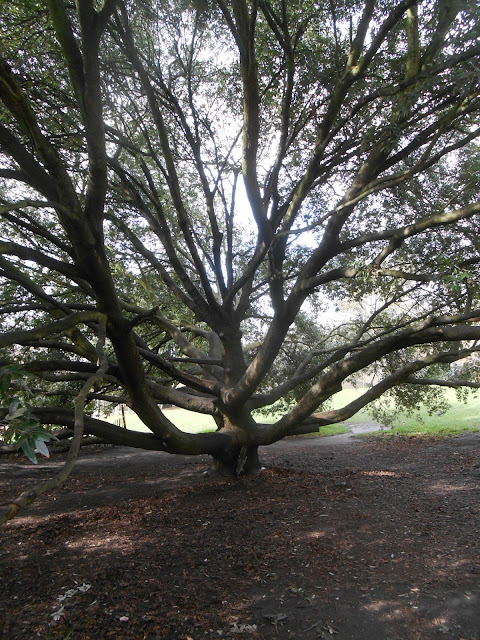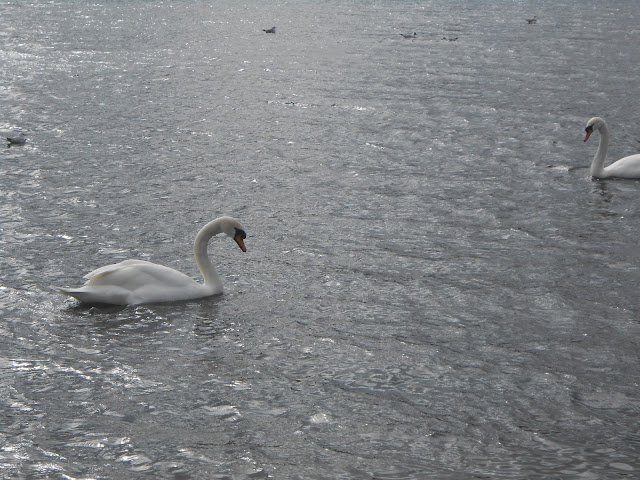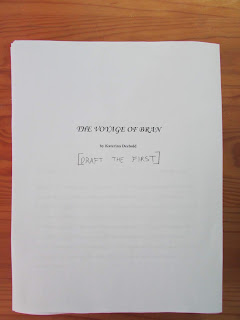LONDON: Act III
March 6, 2017
TODAY, THE WANDERER was going to Kensington Gardens.
She could hardly believe that, less than a year since she had first read J.M. Barrie's Peter Pan in Kensington Gardens, she was going to the place where, in the world of fiction, a baby Peter Pan was raised by birds and experienced his first adventures; the place where J.M. Barrie himself had wandered through; the very place that his brilliant mind had transformed into a magical world filled with fairies and talking birds and joyful children, a little Neverland in the middle of the sprawling city of London. For her, it was nothing short of a dream come true.
The weather was gorgeous: no heavy coat necessary. Clouds rolled through the blue sky without threatening a drop of rain. The flowers were already in bloom, and even though it was only the first week of March, spring was in the air.
As the wanderer strolled deeper into Hyde Park on my way to the Gardens, she came upon the most glorious tree. At the base of its trunk sprouted thick branches, curving outward and upward and splitting into an array of graceful, leafy limbs that reached unrestrictedly toward the sky. Staring in awe, she thought, I have never seen such a perfect climbing tree.
And so, naturally, she climbed it.
Admittedly, she did not climb very high. After stepping up a few branches the wanderer stopped and perched in the Glorious Climbing Tree, gazing round in delight from my slightly higher vantage point. She would have climbed higher—or at least made an attempt to—but she did not wish to keep her ground-bound companion waiting while she tried to safely navigate her way deeper into the head of the tree.
Surrounded by leafy branches, her weight supported by this old, beautiful tree, the wanderer smiled. She was in London, in a tree. She wanted to laugh at the sheer preposterousness of it all.
There were so many birds in Hyde Park and Kensington Gardens. Huge white swans paddled about in the Serpentine, their graceful heads and necks the shape of question marks as they gazed down at the tranquil water. Fat pigeons flocked around a couple sitting on a bench, quietly pecking up crumbs. Green parakeets, their tails straight and long as celery stalks, perched comfortably together in slender tree branches.
What a lovely place to live, if one were a bird.
The Peter Pan statue had appeared out of nowhere. One moment the wanderer was simply walking through the trees and the next Peter Pan had suddenly popped up, like the little imp he is. Arms outstretched, Peter Pan played a tune on his slender pipe, a silent siren’s song that drew humans from all over the world to him. He balanced fearlessly atop a pedestal nearly twice his height, for he, of course, had no need to fear falling; just like the birds and fairies that congregated below him, Peter Pan could fly.
The wanderer reached out and touched the tiny bare toes of The Boy Who Wouldn’t Grow Up, trying to absorb some of his magic.
TODAY, THE WANDERER was going to Kensington Gardens.
She could hardly believe that, less than a year since she had first read J.M. Barrie's Peter Pan in Kensington Gardens, she was going to the place where, in the world of fiction, a baby Peter Pan was raised by birds and experienced his first adventures; the place where J.M. Barrie himself had wandered through; the very place that his brilliant mind had transformed into a magical world filled with fairies and talking birds and joyful children, a little Neverland in the middle of the sprawling city of London. For her, it was nothing short of a dream come true.
The weather was gorgeous: no heavy coat necessary. Clouds rolled through the blue sky without threatening a drop of rain. The flowers were already in bloom, and even though it was only the first week of March, spring was in the air.
"The Serpentine begins near here. It is a lovely lake, and there is a drowned forest at the bottom of it. If you peer over the edge you can see the trees all growing upside down, and they say that at night there are also drowned stars in it. If so, Peter Pan sees them when he is sailing across the lake in the Thrush's Nest. A small part only of the Serpentine is in the Gardens, for soon it passes beneath a bridge to far away where the island is on which all the birds are born that become baby boys and girls. No one who is human, except Peter Pan (and he is only half human), can land on the island, but you may write what you want (boy or girl, dark or fair) on a piece of paper, and then twist it into the shape of a boat and slip it into the water, and it reaches Peter Pan's island after dark."
As the wanderer strolled deeper into Hyde Park on my way to the Gardens, she came upon the most glorious tree. At the base of its trunk sprouted thick branches, curving outward and upward and splitting into an array of graceful, leafy limbs that reached unrestrictedly toward the sky. Staring in awe, she thought, I have never seen such a perfect climbing tree.
And so, naturally, she climbed it.
Admittedly, she did not climb very high. After stepping up a few branches the wanderer stopped and perched in the Glorious Climbing Tree, gazing round in delight from my slightly higher vantage point. She would have climbed higher—or at least made an attempt to—but she did not wish to keep her ground-bound companion waiting while she tried to safely navigate her way deeper into the head of the tree.
Surrounded by leafy branches, her weight supported by this old, beautiful tree, the wanderer smiled. She was in London, in a tree. She wanted to laugh at the sheer preposterousness of it all.
"If you ask your mother whether she knew about Peter Pan when she was a little girl, she will say, 'Why, of course I did, child'; and if you ask her whether he rode on a goat in those days, she will say, 'What a foolish question to ask; certainly he did.' Then if you ask your grandmother whether she knew about Peter Pan when she was a girl, she also says, 'Why, of course I did, child,' but if you ask her whether he rode on a goat in those days, she says she never heard of his having a goat. Perhaps she has forgotten, just as she sometimes forgets your name and calls you Mildred, which is your mother's name. Still, she could hardly forget such an important thing as the goat. Therefore there was no goat when your grandmother was a little girl. This shows that, in telling the story of Peter Pan, to begin with the goat (as most people do) is as silly as to put on your jacket before your vest."
There were so many birds in Hyde Park and Kensington Gardens. Huge white swans paddled about in the Serpentine, their graceful heads and necks the shape of question marks as they gazed down at the tranquil water. Fat pigeons flocked around a couple sitting on a bench, quietly pecking up crumbs. Green parakeets, their tails straight and long as celery stalks, perched comfortably together in slender tree branches.
What a lovely place to live, if one were a bird.
"Of course, it also shows that Peter is ever so old, but he is really always the same age, so that does not matter in the least. His age is one week, and though he was born so long ago he has never had a birthday, nor is there the slightest chance of his ever having one. The reason is that he escaped from being a human when he was seven days old; he escaped by the window and flew back to the Kensington Gardens."
The Peter Pan statue had appeared out of nowhere. One moment the wanderer was simply walking through the trees and the next Peter Pan had suddenly popped up, like the little imp he is. Arms outstretched, Peter Pan played a tune on his slender pipe, a silent siren’s song that drew humans from all over the world to him. He balanced fearlessly atop a pedestal nearly twice his height, for he, of course, had no need to fear falling; just like the birds and fairies that congregated below him, Peter Pan could fly.
The wanderer reached out and touched the tiny bare toes of The Boy Who Wouldn’t Grow Up, trying to absorb some of his magic.
"If you think he was the only baby who ever wanted to escape, it shows how completely you have forgotten your own young days. When David heard this story first he was quite certain that he had never tried to escape, but I told him to think back hard, pressing his hands to his temples, and when he had done this hard, and even harder, he distinctly remembered a youthful desire to return to the tree-tops, and with that memory came others, as that he had lain in bed planning to escape as soon as his mother was asleep, and how she had once caught him half-way up the chimney. All children could have such recollections if they would press their hands hard to their temples, for, having been birds before they were human, they are naturally a little wild during the first few weeks, and very itchy at the shoulders, where their wings used to be. So David tells me." —J.M. Barrie, Peter Pan in Kensington GardensEnd of Act III.



















































Kensington Gardens sounds marvelous! Unfortunately, I can't see much of the pictures (I'm out of doors, and the sun is glaring on my screen), so I shall have to come back and reread this later when I'm indoors.
ReplyDeleteIt absolutely was! I definitely want to go back there someday; one morning was not enough!
Delete